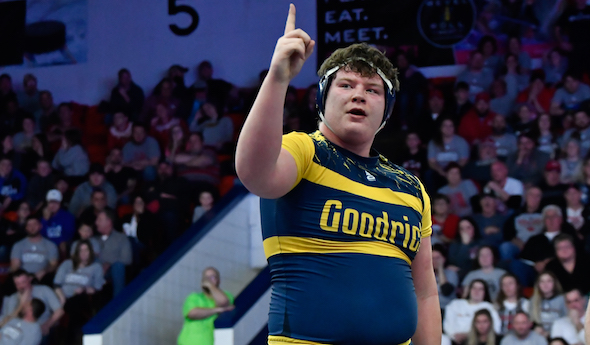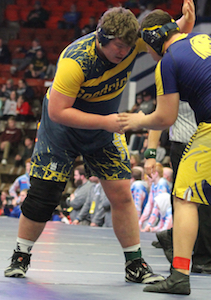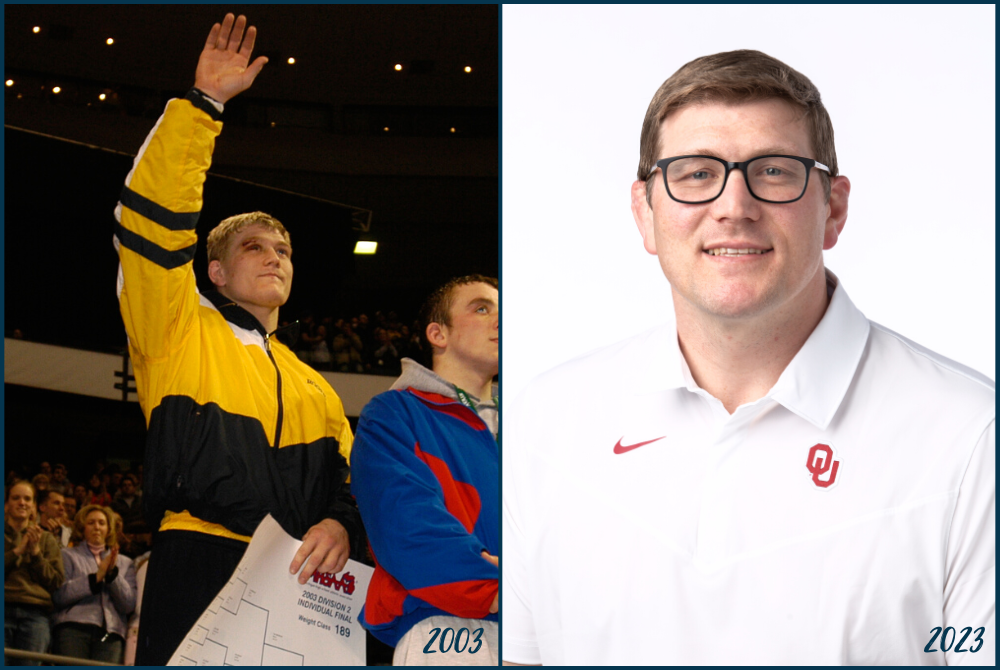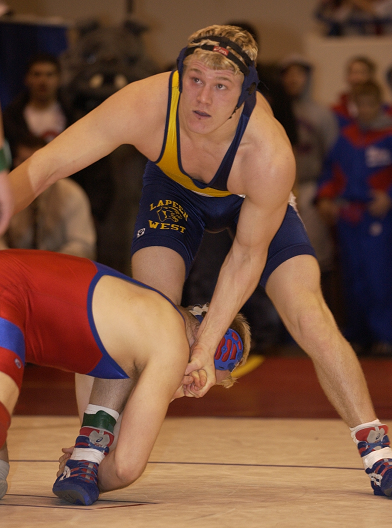
Coffell Makes Mark with Amazing Return
By
Paul Costanzo
Special for MHSAA.com
March 12, 2019
With second overtime running out, and Goodrich’s realistic chances of winning a Division 2 wrestling championship in the balance, Blake Coffell knew he had to move.
 The senior heavyweight diagnosed the situation in his head – an escape would likely force an ultimate tiebreaker, and since it was Lowell’s Tyler Delooff who had scored first in the match, Delooff would have the choice. That wouldn’t do, Coffell thought, as Delooff would probably get away and win the match.
The senior heavyweight diagnosed the situation in his head – an escape would likely force an ultimate tiebreaker, and since it was Lowell’s Tyler Delooff who had scored first in the match, Delooff would have the choice. That wouldn’t do, Coffell thought, as Delooff would probably get away and win the match.
So Coffell went big, sitting out to work toward a reversal rather than standing up. It worked, and as the final seconds ticked away, Coffell had picked up a key victory and kept Goodrich within striking distance of the five-time reigning champions.
“I was facing the whole crowd at the time,” said Coffell, remembering the moment from Feb. 23. “Hearing the noise from our side was just really insane.”
The dual meet eventually went Lowell’s way, and while the loss stung and initially dulled the insanity of that moment for Coffell, it couldn’t take away from all he had gone through to get there.
Almost four months earlier to the day, Coffell underwent surgery to repair severe damage to his knee. And practically every day in between, he worked and focused on being in that moment at Wings Event Center in Kalamazoo, despite how improbable it all seemed at first.
“We talked a lot about, ‘What’s your legacy going to be for Goodrich wrestling?’” Goodrich coach Ken Sirignano said. “We talk about the people in the past, and what we remember them for. Blake Coffell has a great legacy, coming back and doing what he did for the team.”
‘I know that scream’
On Sept. 28, Goodrich played Flint Hamady in a nonconference football game. The Martians were on defense, and Coffell, a defensive lineman, flushed the quarterback from the pocket. After what he had deemed a futile chase, he started to slow down, and that’s when he noticed an offensive lineman bearing down on him from behind.
“I’m a big guy, so I thought, ‘I’ll take him on,’” Coffell said. “I lowered my shoulder a little bit, but with him being up so much taller than me, he hit me up high. I planted, he hit me with all that speed and took me over my knee. I felt that pop instantly, and I started screaming. My friend tore his ACL last year, and I know that terrifying scream. Instantly, I knew what happened.”
Coffell had suffered a torn ACL, MCL, PCL, lateral and medial meniscus, and a fractured knee cap. His football season was clearly over, and the extent of the injury meant that wearing a brace and wrestling through it was also out of the question – especially with a scholarship to wrestle at Lake Erie College already in his future.
Surgery was the only option, even though it meant the two-time all-stater would likely miss his entire senior wrestling season.
“The first person I texted that night (were Lake Erie coaches Jeff Breese and Andrew Bearden),” Coffell said. “I told them about it and said, ‘Is this going to affect my scholarship?’ I got a text back in the morning and they said, ‘We still want you. Don’t worry about it. Get the surgery, and get ready for college.’
“Having him say that really just boosted me up, knowing that I had five more years of wrestling, and that I can be a national champ. I don’t have to be a state champ, I can be a national champ. Knowing I could wrestle in college kept me out of the depression for a while.”
On Oct. 25, Coffell underwent surgery to repair his knee.
‘I’ll be back for team states’
The Monday after surgery, Coffell couldn’t make it through the school day. It was midweek before he managed that feat.
“That’s when I crutched in (to Sirignano’s office) and said, ‘I’ll be back for team states,’” Coffell said. “He said that it would be great if I did, but that he couldn’t put all his faith on that.”
Sirignano explained to Coffell that he would hope for the best, but at the same time he would have to plan for the worst, something Coffell said he understood.
“We thought when he had surgery, that put him at not even four months from team state,” Sirignano said. “The fastest recovery we’ve ever had was James Penfold, who came back in four months the year before. We had no expectation that (Coffell) would make it back, so we kind of aligned our team in that way, which put everyone up a weight.”
 While Coffell used Penfold’s quick recovery as motivation, sitting out as his teammates practiced and competed wore on him. He said that he was depressed, and that it even affected his school work for a while. But he remained plugged into the team.
While Coffell used Penfold’s quick recovery as motivation, sitting out as his teammates practiced and competed wore on him. He said that he was depressed, and that it even affected his school work for a while. But he remained plugged into the team.
“What I would do is I would go to practice for a while when I was still on crutches and watch all the new kids and try to help them,” Coffell said. “That’s when my friends got on me and said, ‘If you can’t practice, you might as well go lift.’ That’s how I took a lot of my anger out. That’s the only way I could take my anger out.”
To further complicate things, the doctor appointment Coffell had circled on his calendar four weeks prior to the MHSAA Finals had to be rescheduled because of the weather. And when he did make it in, the initial news wasn’t what he wanted to hear.
“I went into the room and sat down and was talking to him, he did some tests on my knee and said, ‘It’s looking great. You’re about halfway there,’” Coffell said. “I said, ‘I don’t have time to be halfway there.’”
After some discussion, the doctor informed Coffell he would be cleared to wrestle with a brace.
“I was about to fall down and cry,” Coffell said. “He said to take it easy for the first week and wear a knee brace, and that if I didn’t take it off, I was cleared to wrestle. I hugged him. I was emotional at the time. I remember walking out of there and closing the door and basically screaming. I was so pumped to have that doctor’s note saying I was cleared for wrestling with a brace. I sent a picture of that note to the whole team.”
Sirignano was shocked.
“I was like, that doesn’t even make sense,” he said. “We had three weeks, so we had to see what kind of shape he could get into. It was rough at first; that first week was rough. He had to kind of change the way he wrestled a big, so we were kind of figuring it out as we went.”
Coffell’s clearance also came in time for the Individual District, but that was an idea that wasn’t discussed for long.
“My trainer at my school, she didn’t think I was ready, and I kind of agreed,” Coffell said. “That wasn’t the goal. The goal was to be there walking out of that tunnel in Kalamazoo. That was the goal. That's what I said I would do. If I get hurt trying to pursue an individual state title, that wasn’t the goal. I wanted our picture on the wall.”
The return
Coffell’s return did come earlier than anticipated, however, as the Goodrich coaching staff decided they could need him to defeat Croswell-Lexington in the Team Regional. Coffell had already planned to weigh in that day, so he could have the two-pound allowance at the Team Finals. During his recovery, he had weighed as much as 315 pounds.
“I was eating my sub after weighing in, drinking Pedialyte, drinking water and (Sirignano) comes up to me and says, ‘You’re wrestling today,’” Coffell said. “He said, ‘If you hold your knee or mess with your knee and it looks like it hurts at all, we’re going to pull you.’”
As Coffell started warming up, the anticipation swelled in the crowd. When he checked in and stepped on the mat, it exploded. When he won by pin in the first period, Goodrich had all of the momentum it needed to make it through.
“It was one of those things where no one really expected him to wrestle,” Sirignano said. “When we put him on the mat, the crowd just went crazy. That was as crazy as I heard our crowd all year.”
Coffell also received a void that night, and with three wins at the Team Finals, he finished the season 5-0. Two of those wins – over Delooff (fifth) and Brian Soto of Niles (seventh) – came against wrestlers who would go on to place at the Individual Finals.
While the caliber of opponent he defeated was impressive, it was how it happened that impressed Sirignano most.
“I think the most amazing thing about it was that on three weeks, he won in double overtime against the Lowell kid,” Sirignano said. “Blake was exhausted, I’m sure he was, but I don’t know if it was just mental toughness or what.”
Coffell said the pride of making his improbable return was overshadowed by the team’s loss in the championship match. But it is something he recognized.
He had to endure some more sadness the following week, as he was forced to watch the Individual Finals when he knew he belonged at that level.
“I think I cried both days when everyone started leaving,” Coffell said. “I went and sat up in one of the top rows away from everyone else. I had my head down, and I was crying. Knowing we could have had three finalists, eight qualifiers and eight placers if I wrestled.
“That’s when I started thinking again, ‘You’ve got college.’”
After going through a whirlwind of emotions and physical exertion over a four-month span, Coffell learned plenty about himself – mostly that he was never alone.
“Ken says that if I didn’t wrestle, we wouldn’t have had that shot, but it wasn’t just me that stepped up. It was the whole lineup,” Coffell said. “It was Sam Fisher going down to 152, Honour (Kline) going down to 189. Ryan Angelo, our 103-pounder, he got so much better. Having all those hard workers behind me, it really boosted me. Knowing all these guys are always going to be family, that just makes me really grateful to have Goodrich wrestling.”
 Paul Costanzo served as a sportswriter at The Port Huron Times Herald from 2006-15, including three years as lead sportswriter, and prior to that as sports editor at the Hillsdale Daily News from 2005-06. He can be reached at [email protected] with story ideas for Genesee, Lapeer, St. Clair, Sanilac, Huron, Tuscola, Saginaw, Bay, Arenac, Midland and Gladwin counties.
Paul Costanzo served as a sportswriter at The Port Huron Times Herald from 2006-15, including three years as lead sportswriter, and prior to that as sports editor at the Hillsdale Daily News from 2005-06. He can be reached at [email protected] with story ideas for Genesee, Lapeer, St. Clair, Sanilac, Huron, Tuscola, Saginaw, Bay, Arenac, Midland and Gladwin counties.
PHOTOS: (Top) Goodrich’s Blake Coffell looks to the fans after his win during the Division 2 Final against Lowell at Wings Event Center. (Middle) Coffell wrestles DeWitt’s Anthony Munoz during a Semifinal. (Click for more from HighSchoolSportsScene.com.)

Lapeer West 4-Time Finals Winner Set to Build Champions at Oklahoma
By
Paul Costanzo
Special for MHSAA.com
July 5, 2023
Roger Kish has a habit of accomplishing great things in a short amount of time.
 He won an MHSAA Individual Wrestling Finals title as a freshman at Lapeer West, his first of four.
He won an MHSAA Individual Wrestling Finals title as a freshman at Lapeer West, his first of four.
He was an NCAA finalist as a sophomore at Minnesota.
He was a Division I head wrestling coach at North Dakota State University at 27.
So, it should come as little surprise that before hitting his 40th birthday, Kish is now in charge of one of the nation’s most storied college wrestling programs.
Kish, 39, was recently named the head coach at Oklahoma, a program that has won seven national titles and produced 67 individual champions in its history.
“It’s something I’m very grateful for, and I’m certainly humbled to walk the same halls of some of the Oklahoma greats,” the 2003 Lapeer West graduate said. “Being able to lead this program is nothing short of a dream come true. The administration is great, and in terms of the support system that’s in place, what they have at Oklahoma is second to none.”
Kish takes over a Sooners program fighting to get back into the conversation as one of the nation’s best. His time at NDSU portends well for that, as he had the Bison as high as No. 12 in the country a year ago, the highest ranking in program history.
NDSU also defeated Oklahoma in a Big 12 dual meet, and finished 24th at the NCAAs, with a program record 25.5 points.
“Roger knows what it takes to build a championship-caliber program, and he’s done just that at North Dakota State, with many of his wrestlers having won conference titles and earning All-American honors,” Oklahoma Director of Athletics Joe Castiglione said in a release. “His coaching philosophy aligns with our approach at Oklahoma, and I know he’ll guide our wrestling program toward achieving the standards we’ve set for ourselves.”
Had you told a teenage Kish this would be his future as he was racking up the second-most wrestling victories in state history, he wouldn’t have believed it. Not because it was too ambitious, but because coaching wasn’t even on his radar.
In fact, it wasn’t something he was considering even as he was becoming a two-time All-American at Minnesota.
 “I would be lying to say that I wanted to be a high school or college wrestling coach, career-wise,” Kish said. “I had other plans.”
“I would be lying to say that I wanted to be a high school or college wrestling coach, career-wise,” Kish said. “I had other plans.”
Those other plans were to either continue wrestling beyond college, explore a career in mixed martial arts, or become a chiropractor.
It was all on the table for him as his collegiate career came to a close, but an injury and the long recovery process that followed opened up a new avenue for Kish.
“When I had my surgery, I was off the mats for a lot of time, but I was still able to be on the mats, not as a competitor, but in a way that I could help some of my younger teammates,” he said. “I wanted to be able to give back to those guys that had helped me. That’s where it all began.”
He had been accepted into the chiropractic program at Northwestern Health Sciences University in Bloomington, Minn. But he chose to put that off to continue his recovery for a possible mat return, and to serve as a graduate assistant for the Gophers.
The following year, he was asked to join Bucky Maughan’s coaching staff at North Dakota State, and his career as a coach took off.
“Throughout that year (at Minnesota), I really enjoyed helping out those young guys,” Kish said. “I took an opportunity from Bucky Maughan, because he needed a bigger guy to train with those bigger guys. It seemed like the best route in the moment, so I took it and never looked back. I was an assistant for two seasons, and built really good relationships with stakeholders in the athletic department. Following two seasons under Bucky Maughan, he retired after 46 seasons, and the position opened up. They did a national search, and I think the relationships I had built with stakeholders, and the immediate success of the program in the two seasons I was part of it, led to a great opportunity for me to take over at North Dakota State.”
Kish built a strong program in his 12 seasons at the helm, compiling a 108-70 record. During his time, the Bison moved from the Western Wrestling Conference to the Big 12 and didn’t skip a beat. NDSU is 33-26 in its time in the Big 12, including a 6-2 mark this past season, which was good enough for fourth place during the regular season.
NDSU has sent 21 wrestlers to the NCAA Championships over the past four seasons, with nine becoming All-Americans.
While it’s now in the corner and not in the center of the mat, Kish and wrestling success have long been synonymous.
Kish was 117-27 at Minnesota, placing second in the nation as a sophomore and third as a junior. He also won a Big Ten title at 184 pounds as a sophomore.
He was 252-2 in his high school career, with both losses coming during his freshman season. The 252 wins are second in MHSAA history only to 260 won by Justin Zeerip of Hesperia. Kish was unbeaten in his last 223 matches, placing him third all-time for consecutive wins behind Zeerip and Brent Metcalf of Davison (228).
In 2003, Kish became the 11th wrestler in MHSAA history to win four individual titles. At the time, nobody had won them at higher weights, as Kish won at 160, 171, 189 and 189.
“For me, it probably didn’t feel as big in the moment as it probably did for other people,” Kish said. “For me, it was the expectation to win it as a freshman. My own father said, ‘I don’t know if he’s going to get out of the Regional.’ I took it very personal and serious. But I didn’t think of how hard it was to do in the moment. I’m in awe of how talented these (more recent four-timers) are. Doing it today is seemingly a lot more challenging.”
Wrestling has long been a family experience for Kish, as his father, Roger Kish Sr., coached alongside Hall of Famer John Virnich at Lapeer West.
Kish’s older brother James was a two-time Finals champion who wrestled at North Carolina and amassed 215 career high school victories.
“I was fortunate enough to have a father who gave a tremendous amount of care to the sport and was always trying to keep my brother and I busy throughout our youth,” Kish said. “He always had us in some sort of activity. It probably also stemmed from having an older brother that was a couple years older than myself. I was always a little bit bigger, and he was a little more agile. We were always competitors – call it a brother thing. That allowed each of us to excel in sports, having one another to compete with.”
Kish also played football at Lapeer West and was a starting varsity linebacker as a freshman.
“Wrestling was my passion,” Kish said. “I loved playing football, but it was what I did to take a break from wrestling. It allowed some different facets to cultivate in terms of building relationships and recognizing different factors that helped motivate individuals. … Understanding being on a team, and relying on and trusting other people to help you succeed, whether that’s your teammates or your coaches.”
As someone who made the most of his time in high school athletics, and now remains close to them in a recruiting aspect, Kish is fully aware of how important they are for students.
“Having an outlet for young kids to be active and learn the traits that will help them later in life – the discipline and the humility of wins and losses, the work ethic that’s necessary, understanding what goals are and how to achieve those goals, dreaming a little bigger than what’s realistic – is good for kids,” Kish said. “Athletics is a great platform to do that. Wrestling is a great platform to do that. To help them grow as young men and women, that’s extremely important.”
Made in Michigan is powered by Michigan Army National Guard.
PHOTOS (Top) Roger Kish stands atop the MHSAA champions podium in 2003, and was hired as Oklahoma’s head coach in May. (Middle) Kish helps Lapeer West to the Division 2 team runner-up finish with this match against Mason as a senior. (Lapeer West photos from MHSAA archives; Oklahoma photo courtesy of University of Oklahoma athletic department.)

